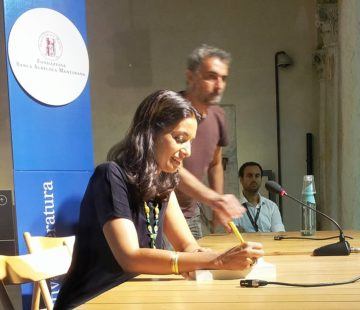 Louis Rogers in Sidecar (image by Carlo.benini – Own work):
Louis Rogers in Sidecar (image by Carlo.benini – Own work):
In 2015, the American writer Jhumpa Lahiri published an essay in The New Yorker titled ‘Teach Yourself Italian’. Proceeding in a present tense of terse sentences, it detailed Lahiri’s relationship with the Italian language – an ‘infatuation’, which at various stages of her life she had pursued for ostensibly practical reasons: a doctorate on Italian architecture in English Renaissance drama; a holiday; a book tour. Finally compelled to relocate to Rome, Lahiri describes how she soon began writing in Italian, renouncing the language in which she had enjoyed a successful career as a writer ever since her Pulitzer-winning debut Interpreter of Maladies (1999). The essay’s conceit comes in the penultimate paragraph, where Lahiri notes in passing that she is ‘writing this sentence in Italian’. An editorial note confirms the article had indeed been translated. Lahiri’s journey into Italian was thus certified; for her English readers, she was now on the other side of a gauze.
Lahiri subsequently returned to the United States to take up a professorship at Princeton, but her work has remained – both linguistically and intellectually – on foreign shores. She writes her literary work in Italian, sometimes translating herself, while any writing in English takes the form of criticism and translations of Italian and Latin writing. This striking and unusual new course has however remained hard to make clean sense of, or, perhaps, to narrativise. A memoir, In Other Words (2015), written in Italian and published in a bilingual edition, gives a vivid sense of Lahiri’s experience of living in Italy and Italian, as well as what writing in another language has offered her – namely a freedom which is paradoxical, both permissive and restricting. Yet what drove her decision, and what sustains it, is left tantalisingly unarticulated.
More here.
